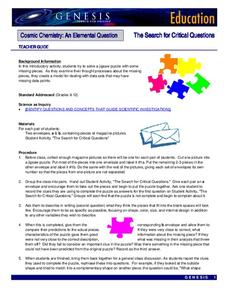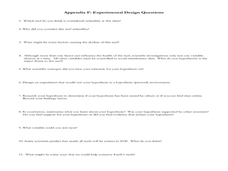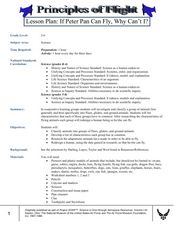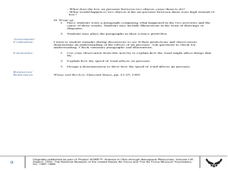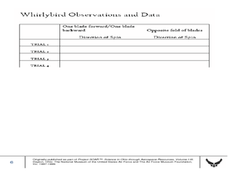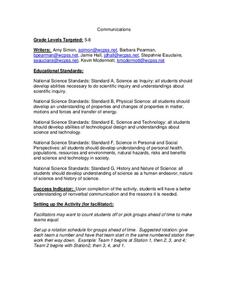Center for Learning in Action
Gases
Explore the properties of gases through one activity and two investigations in which super scientists observe the changes gas makes when encountering different conditions.
Center for Learning in Action
Introducing Physical and Chemical Changes
Young scientists investigate chemical and physical changes to the states of matter—gas, liquid, and solid—as well as solutions and suspensions with a variety of demonstrations, grand conversation, and an interactive quiz to check for...
Cornell University
Friction
Friction and gravity are always at odds! Learners complete a set of activities to explore the relationship between friction and gravity. Groups make conclusions about the factors that affect the amount and type of friction between surfaces.
Cornell University
Sound Off!
Time to witness the effects of sound. Learners analyze different materials to determine their abilities to absorb sound waves. They use free software to monitor the amplitude of the waves to verify results.
NASA
A Different Perspective
What can we learn from the data? Young scholars analyze actual solar data to answer specific questions. The activity presents an opportunity for an open-ended investigation of the data to conclude a five-part series on solar winds.
National Nanotechnology Infrastructure Network
Small Scale Stenciling: Mask Lab
Investigate the procedure for developing computer chips! Learners use solar print paper to create both positive and negative images. They observe the effects of single and multiple exposures and compare results.
Cornell University
Build a Fuel Cell
Discover the connection between redox reactions and fuel cells. Collaborative groups build a Hoffmann Apparatus that demonstrates the electrolysis of water and then convert their models into a fuel cell. They use their fuel cells to...
NASA
The Search for Critical Questions
A puzzle isn't about the individual pieces, but how they work together. Scholars assemble a puzzle and discover missing pieces. They write a description of what they expect these pieces to look like, including as many details as...
Columbus City Schools
Experiencing Eclipses
Don't be caught in the dark! Young scientists investigate the causes of both solar and lunar eclipses using an interactive to help them understand the development of an eclipse over time. They then research facts and characteristics of...
Benjamin Franklin Tercentenary
Ingenious: Franklin Assembles a Scientific Community
Few Americans have heard of the burgeoning scientific community known as the America Philosophical society, started by none other than Benjamin Franklin. With inquiry, research, and discussion, high schoolers come to understand their...
Mathematics Vision Project
Quadratic Functions
Inquiry-based learning and investigations form the basis of a deep understanding of quadratic functions in a very thorough unit plan. Learners develop recursive and closed methods for representing real-life situations, then apply these...
Centers for Ocean Sciences
Ocean and Great Lakes Literacy: Principle 7
Your mission, should you choose to accept it, is to take your class on an underwater adventure. The final installment in a seven-part series involving salt and freshwater bodies takes junior oceanographers below the surface in...
Curated OER
The Commission of Inquiry
Students explore the role and functions of a commission of inquiry and participate in a democratic debate.
Curated OER
Using Science Skills to Investigate Japanese Quail
Sixth graders explore Japanese Quail. They generate and record scientific questions about the quail. Students gather information from various sources and record their data. They compose an inquiry report and include it in a portfolio.
Curated OER
Marine Biology Lesson on Understanding the Dynamics of the Reef Ecosystem
Students compare data from a healty and unhealthy reef ecosystem. In this marine biology lesson, students identify which sample is stressed. They formulate a hypothesis on why the reef is stressed and support their hypothesis with proven...
Curated OER
ToxMystery Lesson Plan 1: Introduction to Common Household Chemical Hazards
Students participate in ToxMystery, a computer game, where they discover potential environmental health hazards in rooms of a common household. For this lesson on household safety, students first brainstorm possible hazards in the...
Curated OER
This Lesson Is a Breeze, So Don't Blow It!
Students conduct an experiment to show that air is all around us and that wind is the movement of air. They construct a weather vane to determine which direction the wind is blowing.
Curated OER
Musical Coat Hangers
In this sound conductors instructional activity, learners use a metal and a plastic coat hanger to determine how sound travels through each and which is more effective.
Curated OER
The Scientific Method Beyond High School
Young scholars identify the different steps in the scientific method. In this biology lesson, students design an experiment given certain materials. They formulate conclusion and write a detailed lab report.
Curated OER
If Peter Pan Can Fly, Why Can't I?
Students redesign a human, using data in research, so that s/he can fly. For this flying lesson, students examine the characteristics and adaptations of groups of animals that can fly. Using this research, students work cooperatively to...
Curated OER
Have a Ball with Bernoulli II
Third graders explore the work of Daniel Bernoulli through experiment and background information. In this Bernoulli lesson plan, 3rd graders participate in air pressure experiments. Students record their observations of the effects of...
Curated OER
Boomerangs Keep Coming Back
Students investigate the flight of paper boomerangs. In this flight lesson, students examine the flight variables of paper boomerangs, which they make, by investigating the concepts of lift and drag. They examine what happens when an...
Curated OER
Principles of Flight: Gyrocopter and the Scientific Method
Students explore the concept of the scientific method. In this investigative lesson, students investigate which direction the blades will spin on a gyrocopter. Student will practice using the scientific method to complete the investigation.
Curated OER
Communications
Students incorporate different disciplines into this lesson. In this science lesson, students investigate the use of communicating without words, and how it is different than communicating with words. They discuss the pros and cons of...









